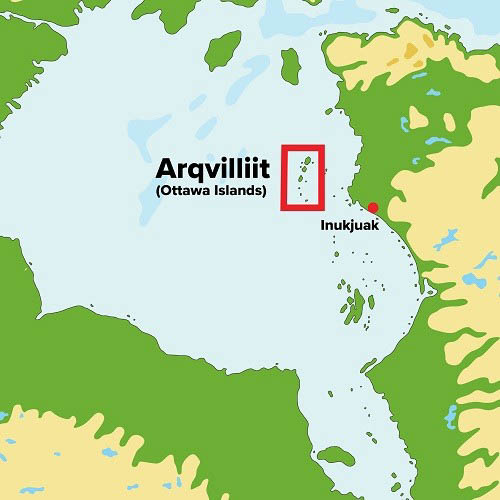Inuit have been leaders in environmental stewardship and effective resource management since time immemorial. That’s why the Government of Canada is working with Inuit communities to protect nature and biodiversity in the northern regions of Canada.
Today, the Minister of Environment and Climate Change, the Honourable Jonathan Wilkinson, announced a $1.43 million contribution for the creation of an Indigenous protected and conserved area for Arqvilliit in partnership with the community of Inukjuak. Arqvilliit, also called the Ottawa Islands, is a chain of 24 islands—spanning 24,000 hectares—in the north-eastern part of Tasiujarruaq ilua (Hudson Bay).
The conservation of Arqvilliit will support the Nunavik Inuit’s cultural connection to the land and protect habitat for species at risk, including the polar bear, a culturally significant species for Inuit. Other species such as the red knot rufa subspecies, the Atlantic walrus, the harlequin duck, and the common eider will also benefit from this project.
The protection of Arqvilliit is an important step toward reconciliation with Nunavik Inuit, by supporting and respecting their way of life, culture, and livelihoods. The creation of this Indigenous protected and conserved area will also support regional development by creating good, local jobs.

“Protecting nature helps conserve Canada’s iconic biodiversity and landscapes as well as fights climate change. Our government is proud to support the community of Inukjuak with this ambitious project to conserve the polar bear, a species that is significant to Inuit culture and livelihood. The protection of Arqvilliit is an important step toward reconciliation with Nunavik Inuit and will also help Canada reach its goal to conserve a quarter of lands and a quarter of oceans in Canada by 2025.”
– The Honourable Jonathan Wilkinson, Minister of Environment and Climate Change
“This project reflects the Inukjuak Inuit engagement for the protection of nature. Our government provides support for the work done by the community. In addition to being exceptionally beautiful, this northern region plays an important role in maintaining Canadian biodiversity. This project ensures that these habitats will be preserved for generations to come and that Inuit traditional knowledge and livelihoods will be perpetuated.”
– Yvonne Jones, Member of Parliament for Labrador and Parliamentary Secretary to the Minister of Northern Affairs
“Protecting polar bear habitat is protecting the polar bears forever. In my lifetime, I have seen how human impacts have affected one species and how that creates a cascade of effects throughout the ecosystem. Arqvilliit is a critically important habitat for polar bears and all the species that live there. Protecting this unique place will ensure a healthy polar bear population and a thriving ecosystem for all organisms that call it home.”
– Shaomik Inukpuk, Town Manager for the Northern Village of Inukjuak and Chair of Arqvilliit IPCA Establishment Steering Committee
Quick facts
- The $1.43 million investment will assist the community of Inukjuak and its partners in establishing an Indigenous protected and conserved area.
- The Ottawa Islands are located in Nunavut and within the Nunavik marine region in north-eastern Hudson Bay.
- The Canada Nature Fund is a key part of the historic Nature Legacy investment of $1.3 billion announced in Budget 2018. The Canada Nature Fund enables Canadians across the country to protect more of the nature we love and the cultures and wildlife that depend on it. Partner organizations share in the costs for every project we support with those funds.
- The Government of Canada has made commitments grounded in science, Indigenous knowledge, and local perspectives, to conserve 25 percent of Canada’s land and inland waters and 25 percent of its oceans by 2025. Moreover, it is working toward conserving 30 percent of each by 2030.
- Canada’s network of protected and conserved areas mitigates the impacts of climate change by protecting and restoring healthy, resilient ecosystems and contributing to the recovery of species at risk. Intact forests and wetlands also capture and store carbon dioxide.
- Canada is making Indigenous leadership an important part of conservation efforts. Up to 27 Indigenous protected and conserved areas are expected to be established under the Canada Nature Fund’s Target 1 Challenge. Further, through Budget 2017, the Government announced support for Indigenous Guardians programs, which support Indigenous conservation through on-the-ground stewardship initiatives.






